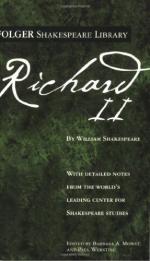|
This section contains 7,556 words (approx. 26 pages at 300 words per page) |

|
SOURCE: Scott, William O. “Landholding, Leasing, and Inheritance in Richard II.” Studies in English Literature 1500-1900 42, no. 2 (spring 2002): 275-92.
In the following essay, Scott contends that Shakespeare situated Richard II's divine right position within a complicated economic system of landholding and leasing, concluding that Richard's misuse of the realm compromises his hereditary claim to the monarchy.
A recent description of the rules of succession to the throne in modern Britain states that “under the common law, the Crown descends on the same basis as the inheritance of land.”1 It is evident that Richard II takes for granted an analogy between succession to the kingship and succession to at least the lands and titles of nobility. As Shakespeare presents the situation, the duke of York warns Richard that if he seizes John of Gaunt's lands and title, he will “take from Time / His charters and his customary rights”2 and...
|
This section contains 7,556 words (approx. 26 pages at 300 words per page) |

|


